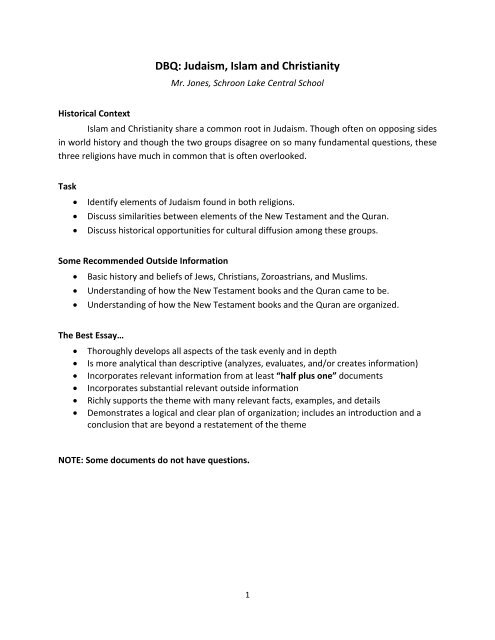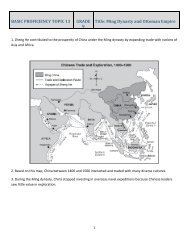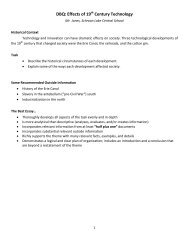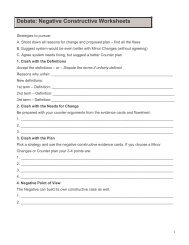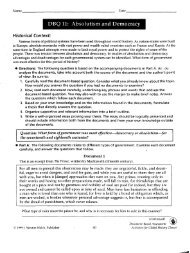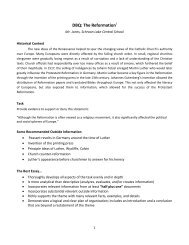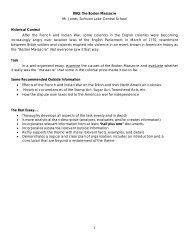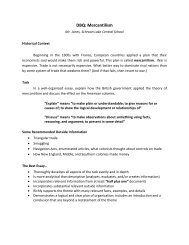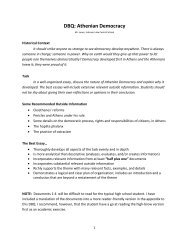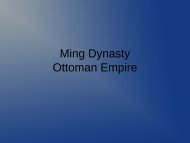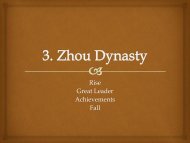DBQ Judaism Islam and Christianity
DBQ: Judaism, Islam and Christianity - JonesHistory.net
DBQ: Judaism, Islam and Christianity - JonesHistory.net
- No tags were found...
You also want an ePaper? Increase the reach of your titles
YUMPU automatically turns print PDFs into web optimized ePapers that Google loves.
<strong>DBQ</strong>: <strong>Judaism</strong>, <strong>Islam</strong> <strong>and</strong> <strong>Christianity</strong><br />
Mr. Jones, Schroon Lake Central School<br />
Historical Context<br />
<strong>Islam</strong> <strong>and</strong> <strong>Christianity</strong> share a common root in <strong>Judaism</strong>. Though often on opposing sides<br />
in world history <strong>and</strong> though the two groups disagree on so many fundamental questions, these<br />
three religions have much in common that is often overlooked.<br />
Task<br />
• Identify elements of <strong>Judaism</strong> found in both religions.<br />
• Discuss similarities between elements of the New Testament <strong>and</strong> the Quran.<br />
• Discuss historical opportunities for cultural diffusion among these groups.<br />
Some Recommended Outside Information<br />
• Basic history <strong>and</strong> beliefs of Jews, Christians, Zoroastrians, <strong>and</strong> Muslims.<br />
• Underst<strong>and</strong>ing of how the New Testament books <strong>and</strong> the Quran came to be.<br />
• Underst<strong>and</strong>ing of how the New Testament books <strong>and</strong> the Quran are organized.<br />
The Best Essay…<br />
• Thoroughly develops all aspects of the task evenly <strong>and</strong> in depth<br />
• Is more analytical than descriptive (analyzes, evaluates, <strong>and</strong>/or creates information)<br />
• Incorporates relevant information from at least “half plus one” documents<br />
• Incorporates substantial relevant outside information<br />
• Richly supports the theme with many relevant facts, examples, <strong>and</strong> details<br />
• Demonstrates a logical <strong>and</strong> clear plan of organization; includes an introduction <strong>and</strong> a<br />
conclusion that are beyond a restatement of the theme<br />
NOTE: Some documents do not have questions.<br />
1
Document 1<br />
“In the beginning when God created the heavens <strong>and</strong> the earth, the earth was formless void <strong>and</strong><br />
darkness covered the face of the deep, while a wind from God swept over the face of the waters. Then<br />
God said, ‘Let there be light’; <strong>and</strong> there was light.” (Genesis 1: 1-3)<br />
Document 2<br />
“In the beginning was the Word, <strong>and</strong> the Word was with God, <strong>and</strong> the Word was God. He was in the<br />
beginning with God. All things came into being through him, <strong>and</strong> without him not one thing came into<br />
being … And the Word became flesh <strong>and</strong> lived among us, <strong>and</strong> we have seen his glory.” (John 1: 1-14)<br />
1. To what event does this passage refer?<br />
Document 3<br />
What is the matter with you that you hope not for greatness <strong>and</strong> wisdom from Allah? And He has<br />
created you in different forms <strong>and</strong> different conditions. See you not how Allah has created seven<br />
heavens in perfect harmony, <strong>and</strong> has placed the moon, therein a light <strong>and</strong> made the sun a lamp? And<br />
Allah has caused you to grow out of the earth as a good growth. Then will He cause you to return,<br />
thereto, <strong>and</strong> He will bring you forth a new bringing forth. (71:14-19)<br />
And We made from water every living thing... (21:31)<br />
He Who has made perfect everything He has created. And He began the creation of man from clay.<br />
(32:8)<br />
1. According to the Quran passages quoted here, what is every living thing made of?<br />
2. According to the Quran passages quoted here, how is the story of creation different from the<br />
Torah?<br />
2
Document 4<br />
“<strong>Christianity</strong>’s presence in the Arabian Peninsula […] must have had a significant effect on the<br />
pagan Arabs. It has often been noted that the biblical stories recounted in the Quran, especially<br />
those dealing with Jesus, imply a familiarity with […] the Christian faith.”<br />
P.12<br />
“The picture that emerges from this brief outline of the pre-<strong>Islam</strong>ic Arabian religious experience<br />
is that of an era in which Zoroastrianism, <strong>Christianity</strong>, <strong>and</strong> <strong>Judaism</strong> intermingled in one of the<br />
last remaining regions in the Near East still dominated by paganism […]. The relative distance<br />
that these three major religions enjoyed from their respective centers gave them the freedom<br />
to develop their creeds <strong>and</strong> rituals into fresh, innovative ideologies.”<br />
P. 13<br />
“Muhammad aligned his community with the Jews in Medina because he considered them, as<br />
well as the Christians, to be part of his Umma [Community of believers]. Consequently, […] he<br />
made Jerusalem […] the direction of prayer […] for all Muslims. He imposed a m<strong>and</strong>atory fast<br />
upon his community, which was to take place annually [… according to] the Jewish calendar […].<br />
He adopted many of the Jewish dietary laws <strong>and</strong> purity requirements, <strong>and</strong> encouraged many of<br />
his followers to marry Jews, as he himself did. (5:5-7).<br />
And while it is true that after a few years, Muhammad changed [some of these things] these<br />
decisions should not be interpreted as a ‘break with the Jews’, but as the maturing of <strong>Islam</strong> into<br />
its own independent religion”<br />
P. 100<br />
Aslan, Reza. No god but God: The Origins, Evolution, <strong>and</strong> Future of <strong>Islam</strong>. R<strong>and</strong>om House. 2005.<br />
1. How did Muhammad know about the faith of Jews <strong>and</strong> Christians?<br />
2. According to Aslan, what was the early relationship between Jews <strong>and</strong> Muslims like?<br />
3. What kinds of things does Aslan note were borrowed into early <strong>Islam</strong> from Jews?<br />
3
Document 5<br />
"Relate in the Book the story of Mary, when she withdrew from her family, to a place in the<br />
East. She screened herself from them; then We sent to her Our spirit (angel Gabriel) <strong>and</strong> he<br />
appeared before her as a man in all respects. She said: I seek refuge from you in God Most<br />
Gracious (come not near) if you do fear God. He said: Nay, I am only a Messenger from your<br />
Lord, to announce to you the gift of a pure son. She said: How shall I have a son, when no man<br />
has ever touched me, <strong>and</strong> I am not unchaste? He said: So it will be, your Lord says: ‘That is easy<br />
for Me; <strong>and</strong> We wish to appoint him as a sign unto men <strong>and</strong> a Mercy from Us': It was a matter<br />
so decreed" (19:16-21).<br />
1. What story, familiar to Christians, is being told here?<br />
Document 6<br />
“I do call to witness the Resurrection Day.” (75:1)<br />
“Does man think that We cannot assemble his bones?” (75:3)<br />
“That Day will Man be told (all) that he put forward <strong>and</strong> all that he put back.” (75:13)<br />
1. What future event, familiar to Christians, is alluded to in these passages from the Quran?<br />
Document 7<br />
“When the Son of Man comes in His glory, <strong>and</strong> all the holy angels with him, then He will sit on<br />
the throne of His glory. All the nations will be gathered before Him, <strong>and</strong> He will separate them<br />
one from the other, as a shepherd divides his sheep from the goats.” (Matthew 25:31-32)<br />
4
Document 8<br />
“Now in the sixth month the angel Gabriel was sent by God to a city of Galilee names Nazareth,<br />
to a virgin betrothed to a man whose name was Joseph, of the House of David. The virgin’s<br />
name was Mary.” (Luke 1:26-27)<br />
“Then Mary said to the angel, ‘How can this be, since I do not know man?’ <strong>and</strong> the angel<br />
answered <strong>and</strong> said to her ‘the Holy Spirit will come upon you, <strong>and</strong> the power of the Highest will<br />
overshadow you…” (Luke 1:34-35)<br />
5


